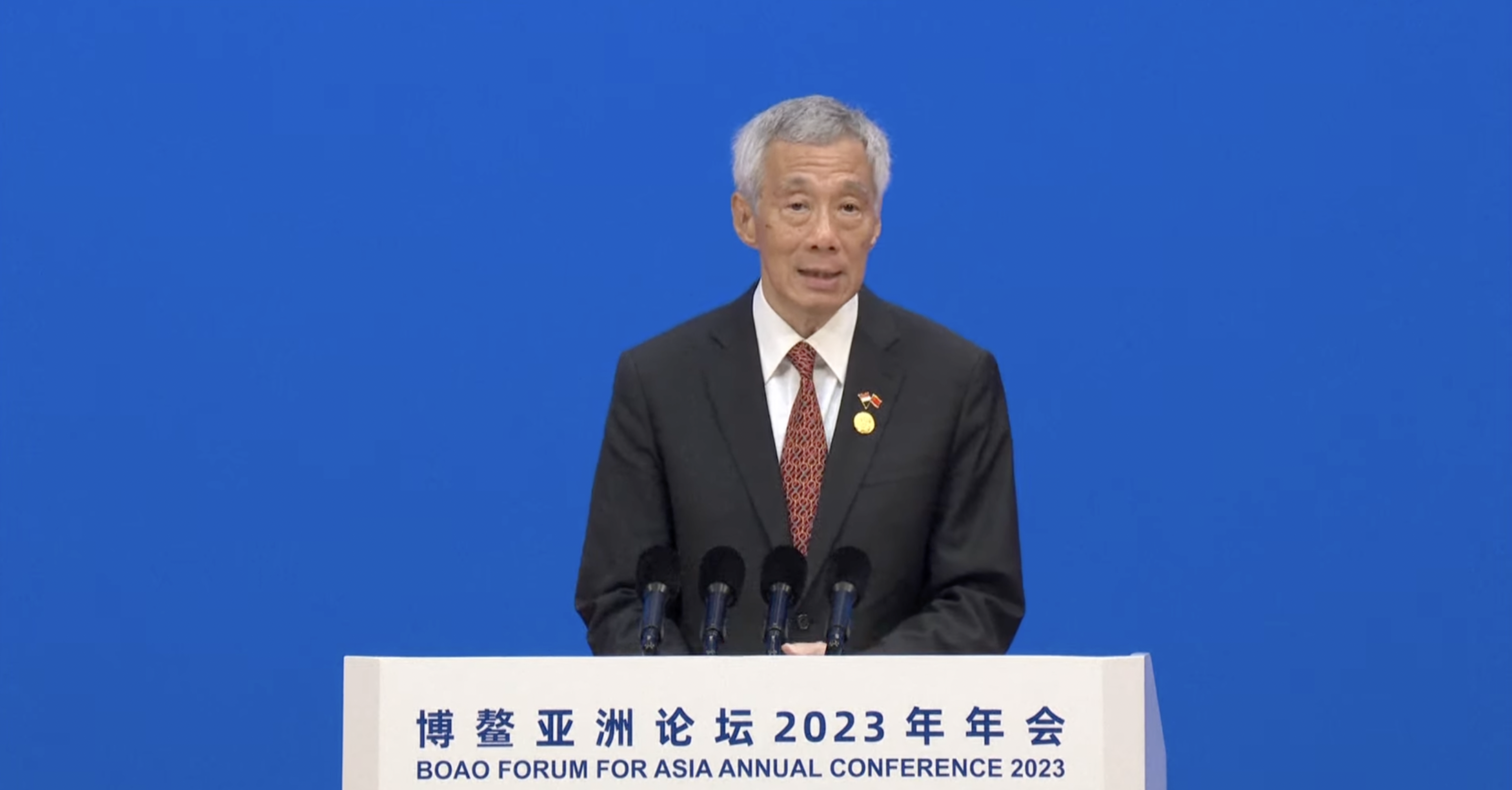Follow us on Telegram for the latest updates: https://t.me/mothershipsg
“Asia should always remain an open region" and insulate economic relations from bilateral issues that arise, said Prime Minister Lee Hsien Loong in a speech on Mar. 30.
Speaking at the Opening Plenary of the Bo’ao Forum for Asia (BFA) in Hainan, China, PM Lee expounded on the importance of regional and international cooperation, as well as the role of Asean in facilitating an increasingly integrated economic network within Asia.
The theme of the conference this year is “An Uncertain World: Solidarity and Cooperation for Development and Challenges”.
The annual report by BFA noted that Asia remained as “a bright spot in the bleak global economic landscape” and commended the region’s economic integration.
Some 2,000 attendees are expected to attend the four-day event, with guests such as Malaysia’s Prime Minister Anwar Ibrahim, Spain's Prime Minister Pedro Sánchez and the Prime Minister of Côte d'Ivoire Patrick Achi.
World outlook
PM Lee began by highlighting Asia as “a vibrant region with enormous promise” and China as one of the largest economies in the world.
Southeast Asia is projected to become the “fourth largest economy in the world by the end of the decade”, he said.
“However, realising Asia's promise depends on the region remaining stable, inclusive, and open. Like every other region, Asia is affected by the troubled global environment and strategic tensions. The Covid pandemic severely disrupted our societies, our economies, and our supply chains.”
Besides condemning Russia’s invasion of Ukraine for violating the UN Charter and international law and undermining the rules-based international order, PM Lee said that the “most worrying” issue was the state of relations between the U.S. and China.
“Big powers have a heavy responsibility to maintain stable and workable relations with one another, because any clash between them will have grievous consequences, for themselves and the world.”
“Economic imperatives are being overshadowed by national security concerns. [...] The bifurcation in technological and economic systems is deepening. And this will impose a huge economic cost on countries, as well as further exacerbate rivalries and frictions.”
He hoped that China and the U.S. “will succeed in stabilising their relationship and establish sufficient mutual trust, and respect to cooperate in areas where the interests are aligned.”
Asia's role in an uncertain world
PM Lee then elaborated on the actions that Asian countries can take to navigate the current global backdrop.
Good relations with China
He said that the region should continue to promote economic cooperation and good relations with China, noting that the country has become “the largest trading partner for almost every country in Asia”.
PM Lee also reaffirmed the strong ties between Singapore and China, noting they are upgrading the China-Singapore Free Trade Agreement and “raising overall relations to a higher level”.
“From time to time, national interests will diverge and bilateral issues will arise. This is unavoidable and when this happens, it is important that we insulate our economic relations from these difficulties and continue to do business with one another.”
Deepen regional cooperation
PM Lee then highlighted the importance of building “a dense mesh of cooperation and interdependence” among Asian countries and pointed to Asean which plays a key role in promoting regional cooperation.
“Asean member states are working systematically to strengthen integration among ourselves”, he noted, raising the example of the Asean Digital Economy Framework agreement.
Various mechanisms such as the East Asia Summit and the Asean Regional Forum “have brought major players together and offered neutral platforms for productive dialogue and engagement.”
PM Lee remarked that the world’s largest Free Trade Agreement, the Regional Comprehensive Economic Partnership (RCEP), was also initiated by Asean.
He reiterated that the complementary regional groupings that exist in Asia are “not mutually exclusive” and will help to deepen ties between Asia and the rest of the world.
Asia must be open
PM Lee’s final point was that “Asia should always remain an open region”.
He called on Asian countries to cultivate relations with the U.S., Europe as well as the rest of the world.
“[Despite] the tensions between China and the United States, their bilateral trade in goods hit a record high of US$700 billion (S$930 billion) last year. Other Asian countries too are keen to expand economic relations with other regions.”
“Strong economic ties across regions will foster a greater interest among more stakeholders to engage constructively in Asia.”
PM Lee concluded his speech by stressing the importance of “stable relations” and pragmatic cooperation. He looked forward to China’s commitment to opening its economy, and their continued support for multilateralism and regional cooperation.
Official visit to China
PM Lee is in China for an official visit from Mar. 27 to Apr. 1 at the invitation of China's Premier Li Qiang.
On Mar. 29, he met with Huang Kunming, the party secretary of Guangdong.
PM Lee looked forward to taking bilateral relations to the “next level” now that China has completed its Two Sessions and 20th Party Congress.
Earlier in the week, he arrived at his first stop in Guangzhou. He visited autonomous driving technology company WeRide and met with the Singaporean community there.
He also paid a visit to the China-Singapore Guangzhou Knowledge City (CSGKC), which is a state-level bilateral project between both countries launched in November 2010.
He will be heading to Beijing on Friday (Mar. 31) where he will meet with China’s president Xi Jinping and premier Li Qiang.
Related:
Top images via YouTube/CCTV Video News Agency
If you like what you read, follow us on Facebook, Instagram, Twitter and Telegram to get the latest updates.
